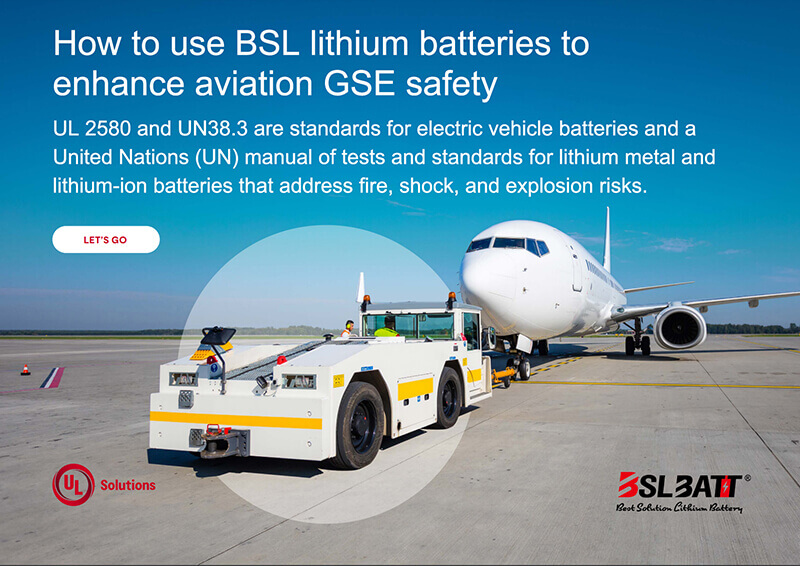
BSL Battery: Industrial expands testing and product validation capabilities
1/6/7F-1 Building1 Zhongkai Innovative Base
Huifeng 6th Road ZhongKai Hi-tech Zone
HuiZhou City, Guangdong, INTL
http://www.lithiumforkliftbattery.com
Ground support equipment (GSE) is traditionally powered by internal combustion engines (ICs), just like the aircraft they support. The burning of diesel, gas, or propane, however, results in carbon emissions that negatively impact the environment. Airlines and airports are replacing diesel-fueled ground support equipment (GSE) with lithium-ion battery-powered machines to meet evolving environmental requirements. By switching from diesel-fueled equipment, we reduce carbon emissions, fueling and engine maintenance costs, as well as the health risks associated with internal combustion engine emissions and noise.
BSL Battery – Industrial Expands Testing and Product Validation Capabilities with Field Shaker
To make sure the truck is “revived” immediately and the life expectancy is excellent after a “heart transplant”, BSLBATT Battery team conducts strict performance tests to assure all BSLBATT battery products meet industrial standards for quality and compatibility for every applications. Announcing Last month an expansion in-house with all the testing required to meetUL 2580 and UN/DOT 38.3compliance Testing and product validation capabilities for equipment, including field shakers.
To learn more about UL 2580 testing and UN38.3 certification with BSL Battery – Industrial, keep watching our video or read on!
As they work to convert their existing ground support equipment into more energy-efficient electric vehicles, key players in the aviation industry support the development of these safety standards.Retrofitting lithium-ion batteries into more traditional diesel-powered equipment when upgrading existing fleets is also addressed in the Standard.
Most ground support equipment today is powered by gasoline or diesel engines, and some by lead-acid batteries. Emissions from internal combustion engines can harm the environment and ground personnel. Over the next three decades, airports around the world have committed to removing all diesel-powered vehicles from their apron and airside.
A $640,000 (USD) grant was awarded by The Chicago Department of Aviation toward United Airlines’ $1.43 million (USD) joint investment with the Environmental Protection Agency to purchase 26 new zero-emission GSE vehicles.United Airlines will save more than 1.4 million gallons of diesel fuel and reduce emissions of carbon dioxide (CO2), the primary air pollutant in the generation of greenhouse gases, by more than 16,000 tons (as well as other byproducts of fuel emissions).
The Voluntary Airport Low Emissions Program (VALE) offers financial incentives for airports to reduce their carbon emissions.According to the FAA, this program has funded 121 projects at 56 airports since September or 2020.Many airports around the world are eligible for grants.
Retrofitting GSE lithium batteries
Some aviation GSE is already powered by lead-acid batteries. However, lithium batteries are significantly lighter, smaller, and offer better energy storage and physical space than lead-acid batteries. Because of these reasons, the aviation industry is retrofitting its lead-acid-powered GSE fleets with lithium batteries. Since lithium retrofit batteries are not closely regulated, the aviation industry is particularly concerned about their safety. In order to address this concern, the Standard provides for the retrofitting of lithium batteries into more traditional diesel and lead-acid powered equipment.
Maintenance and operations at airports
Unlike lead-acid batteries, lithium batteries require no maintenance other than charging. Due to the prevalence of lead-acid powered GSE in their fleet inventory, most airline operations facilities already have charging equipment. Lithium battery chargers, new battery charging stations, and their facilities can be tested for safety compliance and for fire, electric shock, and explosion risks.

Haley Ning
In the aviation industry, managers of dangerous goods and ground support teams agree that prevention is the best way to increase safety. Haley Ning said: “UL’s comprehensive testing facility enables in-house qualification of everything from the smallest to the largest battery system, eliminating the need to outsource any testing aspects of UL or UN certification and speeding up the process. ”BSL Battery – Industrial Chief Operating Officer. “Our strong relationship with UTL, an Underwriters Laboratories compliant laboratory, coupled with these strong testing capabilities, enables BSL Battery – Industrial to rapidly develop and deliver world-class energy storage systems to critical applications for our end users. All BSL Battery – Industrial systems are designed and tested to meet the rigorous standards of the modern operating environment, with an unwavering focus on safety and reliability. We remain committed to providing clean energy solutions to this fast-growing market.”
Lithium-ion Transition
The first step in implementing lithium-ion battery technology is to assess the condition of the current fleet of ground support equipment. Consider these questions as a starting point:
- Is there equipment that is nearing the end of its useful life that would need to be replaced?
- Could you easily replace the lithium-ion battery pack on your existing electric GSE?
- You should evaluate the specifics of the fleet operations once you have answered the first two questions:
- What is the average number of hours per day that the GSE is used?
- Is there a requirement for battery charging infrastructure?
- What are the environmental and regulatory requirements? (not just today, but in the future as well)
A detailed return on investment (ROI) calculation can provide insight into the economic benefits of switching to a lithium-ion or lead acid power source. Don’t forget to include maintenance costs, battery replacement costs, and refueling/charging infrastructure costs when calculating the total cost of ownership.
GSE with zero emissions and high performance is in high demand. Because lithium-ion batteries provide significant benefits, IC engines are increasingly being replaced by lithium-ion batteries.
In light of government regulations on emissions, now may be the right time to start looking at high performance lithium-ion batteries for GSE fleets.









